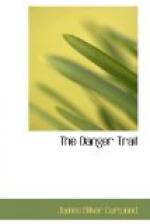For the first time Howland noticed that the thin muslin curtain, which he thought had screened a window, concealed, in place of a window, a carefully fitted barricade of plank. A sudden thrill shot through him as he rose to examine it. With his back toward Thorne he said, half laughing, “Perhaps Gregson was afraid that the fellow who clipped off his finger would get him through the window, eh?”
He pretended not to perceive the effect of his words on the senior engineer. The two sat down to supper and for an hour after they had finished they smoked and talked on the business of the camp. It was ten o’clock when Thorne and Jackpine left the cabin.
No sooner had they gone than Howland closed and barred the door, lighted another cigar, and began pacing rapidly up and down the room. Already there were developments. Gregson had lied to him about his finger. Thorne had lied to him about his own injuries, whatever they were. He was certain of these two things—and of more. The two senior engineers were not leaving the Wekusko because of mere dissatisfaction with the work and country. They were fleeing. And for some reason they were keeping from him the real motive for their flight. Was it possible that they were deliberately sacrificing him in order to save themselves? He could not bring himself to believe this, notwithstanding the evidence against them. Both were men of irreproachable honor. Thorne, especially, was a man of indomitable nerve—a man who would be the last in the world to prove treacherous to a business associate or a friend. He was sure that neither of them knew of Croisset or of the beautiful girl whom he had met at Prince Albert, which led him to believe that there were other characters in the strange plot in which he had become involved besides those whom he had encountered on the Great North Trail. Again he examined the barricaded window and he was more than ever convinced that his chance hit at Thorne had struck true.
He was tired from his long day’s travel but little inclination to sleep came to him, and stretching himself out on the lounge with his head and shoulders bolstered up with furs, he continued to smoke and think. He was surprised when a little clock tinkled the hour of eleven. He had not seen the clock before. Now he listened to the faint monotonous ticking it made close to his head until he felt an impelling drowsiness creeping over him and he closed his eyes. He was almost asleep when it struck again—softly, and yet with sufficient loudness to arouse him. It had struck twelve.
With an effort Howland overcame his drowsiness and dragged himself to a sitting posture, knowing that he should undress and go to bed. The lamp was still burning brightly and he arose to turn down the wick. Suddenly he stopped. To his dulled senses there came distinctly the sound of a knock at the door. For a few moments he waited, silent and motionless. It came again, louder than before, and yet in it there was something of caution. It was not the heavy tattoo of one who had come to awaken him on a matter of business.




